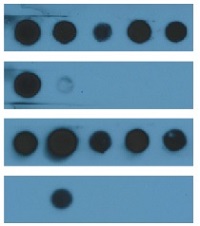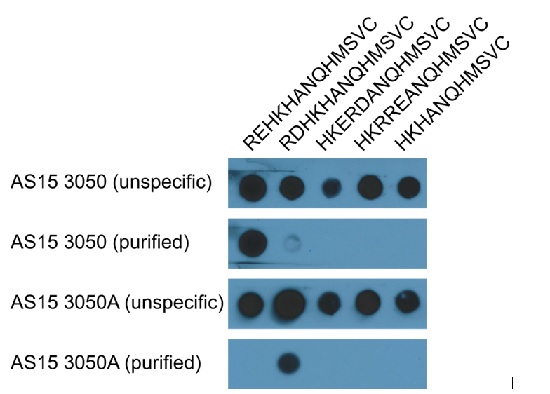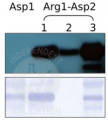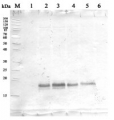1

Anti-RE | N-terminal arginylation
AS15 3050 | Clonality: Polyclonal | Host: Rabbit | Reactivity: RE | N-terminal arginylation
- Product Info
-
Immunogen: KLH-conjugated synthetic peptide: H-REHKHANQHMSVC-NH2
Host: Rabbit Clonality: Polyclonal Purity: Immunogen affinity purified serum in PBS pH 7.4. Format: Lyophilized Quantity: 2x50 µg Reconstitution: For reconstitution add 50 µl of sterile water to each tube Storage: Store lyophilized/reconstituted at -20°C; once reconstituted make aliquots to avoid repeated freeze-thaw cycles. Please remember to spin the tubes briefly prior to opening them to avoid any losses that might occur from material adhering to the cap or sides of the tube. Tested applications: Dot blot (Dot) Recommended dilution: 1 : 1000 (Dot)
- Application Examples
-
Application information 
- Membrane: PVDF, Hybond 0.45 μm (GE Healthcare)
- 0.5 µg synthetic peptide per spot
- Membrane was blocked overnight in TBST, 4% Blocking Agent (GE Healthcare)
- Primary antibodies: 1:10 000 in TBST 2% Blocking Agent
- Secondary antibody (AS09 602): 1:25 000 in TBST 2% Blocking Agent
- Detection: chemiluminescent detection reagent
Courtesy of Dr. Sebastian Hoernstein, Faculty of Biology, University of Freiburg; Germany - Additional Information
-
Additional information: Antibody is purified using substractive purification method Additional information (application): MG132 or epoxomycin are recommended to use to inhibit proteasome and significantly increase signal from the arginylated proteins - Background
-
Background: Arginylation is a post-translational modification of an existing peptide chain by addition of an extra arginine. This modification changes primary sequence of protein as well as it's surface change. It is mediated by arginyltransferase ATE1. Arginylation plays an essential role in multiple physiological pathways, for example, in vivo arginylation constitutes a mechanism for degradation of preprocessed proteins or proteolytic fragments that bear Asp and Glu on their N-termini. - Protocols
-
- Reviews:
-
This product doesn't have any reviews.



